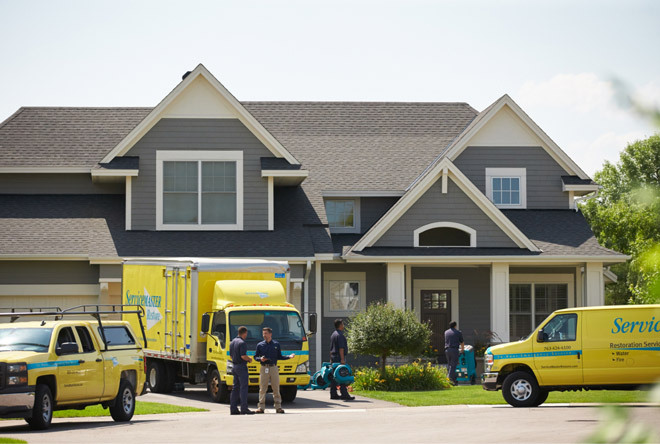Sewage Removal Specialists in Cleveland, Akron, Wooster
We make homes and businesses clean and safe again after sewage backups
A sewage backup is always a serious problem because sewage water contains disease-causing bacteria. The cleanup work following any sewage leak should be performed as soon as possible to minimize exposure to harmful bacteria, unpleasant smells and unwanted moisture.
If a sewage backup occurs inside your basement from a sewage spill or septic tank overflow, don't hesitate to call us, ServiceMaster by Disaster Recon, the water restoration experts! Our sewage removal services will protect your property and address all the unsanitary odors and biologically harmful chemicals by thoroughly cleaning, decontaminating, deodorizing and sanitizing all affected areas.
The cleanup of raw sewage should not be done by the homeowner or by any untrained individual. When you hire ServiceMaster by Disaster Recon for spilled sewage cleanup, you can be confident that your family and your property will get the safest, most thorough cleanup services available.
Sewage cleanup services from ServiceMaster by Disaster Recon:
- Emergency response available 24/7
- Work performed by trained & certified technicians
- Complete removal of contaminated material
- Complete cleanup with air scrubbers, dehumidifiers and other specialized equipment
- Follow-up visits to check for mold and proper IAQ
- Mold remediation available if necessary
Common causes of a sewage backup
Most sewage backups often occur from a blockage in the sanitary sewer line, where wastewater may enter your home throughout the floor drains and other plumbing lines within the building. Some causes of sewage backups are preventable, while others aren’t evident until the backup occurs. Here are some of the main causes:
- Solid flushes. A blockage in the waste line between a plumbing fixture and the main septic drain line is often referred to as a “solid flush.” This problem typically occurs when a large or inappropriate object is flushed down the toilet, such as food fat and cotton buds, creating a blockage somewhere in the waste line.
- Structural damage. When a waste pipe develops a crack, detaches from an adjacent pipe section, or is crushed because of building settlement - sewage backup can occur.
- Root blockage. The main drain line that connects the home to a septic tank or municipal sewer can be susceptible to clogging from tree roots. The roots grow naturally toward a moisture source, and typically enter the sewer line through pipe joints.
- Sewer backup or surge. If a blockage occurs in a city sewage line, wastewater usually overflows at the lowest opening, which can be a sink or toilet in a home’s basement or lower level.
Protect your Ohio property from sewage backup
Is your home experiencing sewage backup or are you dealing with septic tank problems? Take the safe, smart and speedy solution to sewage cleanup. We are Northeast Ohio's experts for sewage removal, water damage repair and other water emergency cleanup solutions.
Call ServiceMaster by Disaster Recon today for a free quote for our fast and complete sewage cleanup services in Akron, Cleveland, Canton, Medina, Lorain, Lakewood, Elyria, Cuyahoga Falls, Euclid, Mentor, Gates Mills and surrounding areas of Ohio!


